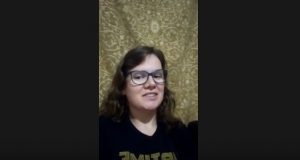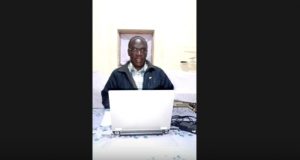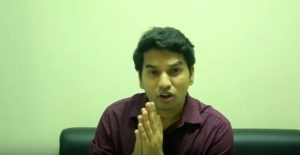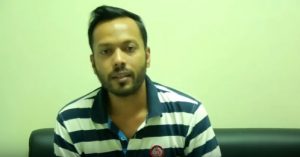Written by: Greta Pons, Carolyne Nyarangi and Rianne Doller on behalf of Icare Sustainably International
“The Coronavirus pandemic has left students’ graduation postponed for next year and consequently endangers their future jobs prospects”
Icare Sustainably made a documentary about the struggles students face during Corona and the consequences of postponing, possible indefinitely, their education to prevent spread of the disease.
The students will not only share their experiences, but also give suggestions to the government how they can be assisted to continue their education.
We haven’t only talked to students, but will also share the perspective of teachers and professionals in the NGO world.
This project is in line with Icare Sustainably’s mission to support marginalized communities and their development. This we do by finding sustainable solutions inspired by the 17 SDGs of the United Nations.
Let’s hear what the board of Icare has to say about this project:
Carolyne Nyarangi, Icare Sustainably Vice-President and Director of Kenya chapter:
“Icare Sustainably wants to ensure inclusive and equitable quality education and promote lifelong learning opportunities for all. Education is the key to prosperity and opens a world of opportunities, making it possible for each of us to contribute to a progressive, healthy society.
….” in this we will train the tutors and students on required ICT skills and how to use the online teaching platforms successfully. We will also offer consultancy on how to acquire and maintain affordable ICT infrastructure and systems essential for quality service delivery to partner institutions especially those working in rural and marginalized communities.
Icare sustainably will work as an intermediary between the global organizations interested in investing ICT infrastructure and provision of ICT gadgets to marginalized and rural communities”
Rianne Doller, the content manager at Icare Sustainably and country director of the Netherlands also added:
”Icare will create awareness of the long-term implications of COVID-19 for development, beyond direct effects of the disease. In that way, we can guarantee that marginalized communities will not only survive the pandemic, but will keep continuing to work towards a brighter future.”
See Rianne’s contribution to the documentary

Watch the documentary ‘Disillusioned by the virus – Impact of Covid-19 on education’ on Youtube:
We also summarized the individual stories for you to read below. Also, find the videos of the individuals.
Table of Contents
Brown Wanjala from University of Eldoret, Uasingishu county Kenya
Mr Brown has told us his personal experience not only as a student of last year BSc of education and how the COVID pandemic has delayed his graduation and consequently his future job, leaving him not only uncertain of when he will be able to finish his degree but what to do during this 2020/2021 school year. Universities are not reacting to the situation
Additionally, and as Mr Brown mentions on his video, his temporary job to subsidize his studies, a shop located in the university area which mainly focussed on giving students gaming experience and watching football games and other movies at a fee, has been drastically affected by the pandemic since no students are attending their classes and consequently not around the university area.

Mabor Peter Chol is a Sudanese refugee living and studying in Kenya
Mabor is currently a student at Kabarak university doing a bachelor of science in clinical medicine and community health.
He talks of the effect of the COVID-19 pandemic on the Sudanese refugees living in Kenya citing lack of awareness by the community on how to handle the situation thus causing a lot of panic in the community as a whole. He also talks of the fact that learning has shifted to online and the Sudanese refugees are finding it difficult to catch up with the new technology and tools required for effective online learning which makes it difficult for them to engage with the learning materials. Also, accessing reliable networks consistently is a problem. Additionally he says that the special needs children need proper guidance from the parents, most of whom have little or no knowledge about technology.
He talks of the fact that most of the online learning lessons have shifted to night time which is a big challenge for them that have no electricity or internet connectivity. They also lack gadgets required for most of the lessons, which is a huge hindrance in effective learning.

We also interviewed Mabor to find out more about his story:
When did you last attend one of your university lectures?
The last time I attended the last lectures was on August 2020 through online platform
What have you done since then regarding your studies / practical learning? (like readings, research, internships, etc.)
Since the greater part of the learning has moved to web-based learning stage, I had been doing some online short courses along with my ordinary college class and that has truly improved the nature of the abilities and more extensive information
What has been the official communication from the university regarding the situation?
The university has been trying an online platform for continuous learning, which has been difficult since there is no internet coverage for most learners.
Do you have access to your studies’ learning material online or can you borrow any from the library or other media?
The University has sorted out online stage for learning materials all together for the students to get to and that has truly helped us as students
Which support have you received?
There isn’t uphold I had gotten from my sponsors as a result of the impacts brought by COVID-19 however I do get a few aides from my family members who I am remaining along with and this has truly affected us as a family.
What do you think can be done to improve the situation?
If there is any way for the government and other learning institutions to subsidize the technological learning such as networking, laptops and other accessories of online learning then it will truly help most of the students and/or pupils.
What does it mean to you to have quality education?
Being able to apply the skills, knowledge gained to better yourself, improve quality of life and changing the society to be a better place by applying your skills and knowledge where necessary.
Class 8 and form 4 candidates in Kenya disrupted from sitting for their final exams
Class 8 and form 4 students in Kenya were supposed to sit for their final exams in Nov 2020. Unfortunately, the schools closed in early March. Some students were lucky to be in urban private schools which enabled them to continue learning through the online platforms. Although, they still had challenges adjusting to the new way of learning. Also, these pupils are the absolute minority of all students in Kenya. The public schools, which carry the majority of the Kenyan children, especially from low income households and marginalized communities, had no way to reach their learners.
We talked to Rolf Fortress, a pupil at Hill school primary school in Eldoret Kenya. Rolf is a class 8 candidate and was already prepared to transition from the primary school level to high school. However, this was interrupted by the COVID-19 pandemic. He says that they were only sent some assignments through WhatsApp for one week, but the teachers were unable to keep up with that due to the fact that most of the learners could not access the learning materials. The students either lacked the gadgets or their parents were too busy with their phones to give them to their children to get at the assignments. Rolf also said that he required some one on one assistance on some subjects that he was weak at, but that was not possible because his parents are too busy trying to make ends meet and there was no way he could access his teachers.
Rolf cited a lot of other challenges that hindered him from being able to prepare for his exams. There are lessons offered by KICD (Kenya Institute of Curriculum Development) through most of the local radio and TV channels. He talks about those challenges in the video below:

As a bonus, see young girl recite SDG 4 and 10

Icare sustainably was also able to interview a university lecturer from the University of Eldoret in Kenya who gives us a perspective on the extent of the effects of the pandemic on quality education
Zachary Shitote, lecturer University of Eldoret, Kenya.
Zachary is a lecturer at the university of Eldoret school of business and management services.he teaches project planning and management and sustainable development. He is also the chairman of the board of directors at Icare Sustainably (Kenyan chapter). Zachary talks of the extreme precarious situation that the lecturers find themselves in during this difficult period of the COVID-19. Some of those challenges are changing the mode of teaching from face to face to fully online lectures. Unfortunately, most of the lecturers are not ICT literate and lack the necessary skills to conduct a successful lecture online. This has affected the ability to offer quality education. Additionally, lecturers like Zachary himself live in rural areas where the internet and electricity connectivity infrastructure is very poor, which also makes online teaching challenging. Lastly, the costs associated in delivering the lesson for the lectures and the learners in terms of data bundles is also very high which has caused some learners to drop the lectures. Since it is not common for people in Kenya to have strong WIFI in their homes.
According to Zachary some of the lecturers have also lost their lives through the coronavirus which has caused a lot of fear amongst them. Additionally, some of the lectures are also PhD and master students in various fields and have not been able to complete their own studies on time. This is particularly a stressful situation for those that are on scholarships and are required to complete within a stipulated period of time. Otherwise they risk losing the donor support.

Icare sustainably was also able to collect from social impact leaders from leading INGOs from Bangladesh and the Philippines
Jolita Isobel Atienza, Development worker in the Philippines
Jolita works as a development worker in the Philippines and talks about how different SDGs have been affected in the country and how different stakeholders are working together to make the situation better. She says “like most developing countries, the Philippines has been making substantial improvements in meeting the sustainable development goals such as SDG1, 8, and 10. However, the current COVID-19 pandemic is putting the country at risk of not achieving its targets by 2030, due to business closures (severely affecting the SMEs) and employment. However, all sectors are trying their best to work together to reduce the impacts and assist those affected especially the marginalized.”

Shayek Ahmed, a humanitarian worker from Bangladesh
Shayek Ahmed is a humanitarian worker from Bangladesh, located in South Asia. He started by describing the situation in South Asia throughout the critical phase of COVID-19. “The outbreak caught everyone by surprise and the majority of the countries in South Asia enforced lockdowns to control the spread. As a result, several aspects such as work style, education, psychosocial, and economic were largely affected. India, Pakistan, and Bangladesh (countries from South Asia) are on the rough ride and low-income people are likely to be more affected. The situation will become even more severe as these countries have pre-existing challenges such as high population, frequent natural disasters/climate change issues, insufficient health facilities for the masses, and a only partially developed IT infrastructure. These issues are already raising serious concerns in terms of achieving the 17 sustainable development goals”.
He also talks of a unique challenge, which would be to prevent the spread of COVID-19 in the world’s largest refugee camps of around 1.1 million people, located in Cox’s Bazar district in southeastern of Bangladesh.

Nur Ahmed, a humanitarian worked from Bangladesh
Nur is a humanitarian worker in Bangladesh and he shares his thoughts about the impact of COVID-19 in Bangladesh mostly focusing on issues related to SDG 4-Quality Education and SDG 10-Reduced Inequality. Nur added that quality education means ensuring equality in education at all levels, as education is a fundamental human right.” Education must fully assume its central role in helping people to forge a more just peaceful and tolerant society” With this temporary closure, according to Mr. Nur, most people live under the poverty line. And during this pandemic, the underprivileged are struggling to survive due to total shutdown and reduced income. Those people are fighting to make ends meet, so buying smartphones is too much of a luxury to consider. He also points out that the Lack of network coverage in remote areas is a challenge causing poor internet connectivity. This poses a huge challenge in terms of online lessons: “There should be steps to modify the syllabus keeping the important topics intact and try to explore processes such as conducting exams in a large open place”

Takbir Manjar, a humanitarian working in Bangladesh
Takbir is also a humanitarian worker in Bangladesh. He shared his views regarding the impact of COVID-19 on SDG 1: No poverty, SDG 2: Zero Hunger, and SDG 3: Good Health and Well-Being. In doing so, the open market society is an important aspect as it is quite tough to stay at home without work. No work means sometimes no pay, and this leads to no food. This is the truth for daily wage workers of South Asian countries. Most notable are the Ready Made Garments (RMG) workers who are suffering because of a salary cut (due to the fact that around half of the production of Bangladesh garments industry supplies got canceled). This puts the workers in heavy debt that is creating defaults on rent payments, reducing consumption, and limiting the money they usually send home to their families in rural villages.
Another affected group he mentions is the street children of Dhaka city looking for food. This together with lower middle-class people losing jobs, increases the pressure in the streets and communities, thus hampering the overall well-being in regard to both good physical and mental health and well-being. The Bangladesh government is trying to mitigate the situation with stimulus packages and by supporting the garment industry with the help of private banks (lowering interest rates and providing short-term loans). There is however a boom in digitalization as millions of employees are now utilizing digital tools to communicate and continue work from home. Interestingly, the uptake of these digital solutions was not a challenge in Bangladesh. Moreover, the promotion of Fintech through online and mobile banking transactions has increased along with people focusing more on online delivery mechanisms

Find out more in our next event ACT4SDGs or Join our Facebook forum
Have a question or a comment, participate in our forum to open Quality Education Conversations https://www.facebook.com/events/673446923378829/?active_tab=about

